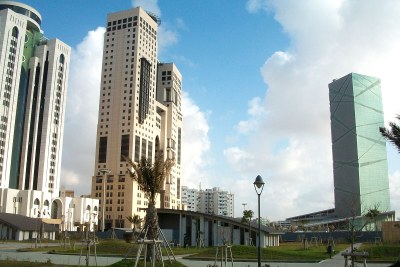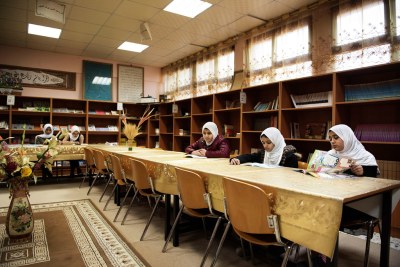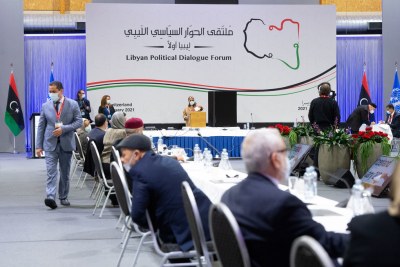-
Libya: Nation's Promising Transition Stalls
ISS, 13 August 2021
The surge of hope inspired by the remarkable breakthrough in Libya's year-old peace process is starting to fade as negotiations to enable viable elections on 24 December bog down. Read more »
-
Tunis Afrique Presse, 17 July 2021
Minister of Foreign Affairs, Migration and Tunisians Abroad, Othman Jerandi on Friday reviewed with Arab Group of Permanent Representatives to the United Nations the conclusions of… Read more »
-
Libya: Libyan Exile's Life Captured Vividly On Film
New Frame, 28 July 2021
The recently released documentary The Colonel's Stray Dogs provides a political and personal perspective of Libya under the rule of the late Muammar Gaddafi. Read more »
-
Tunisia: Libya's Combatants Declare Key Coastroad Open
Tunis Afrique Presse, 30 July 2021
Libya's warring sides said on Friday they had reopened the main coastroad across the frontline, a key element of a ceasefire they agreed last year that has involved months of… Read more »
-
Libya: Mercenaries 'Impede' Peace, Must Leave to Allow Elections - UN Human Rights Experts
UN News, 30 July 2021
The continued recruitment and presence of mercenaries in Libya is impeding "progress in the peace process" and an obstacle to upcoming elections, independent UN human rights… Read more »
-
Libya: UN Mission 'Deeply Concerned' Over Abduction of Top Govt Staffer
UN News, 10 August 2021
The UN Support Mission in Libya (UNSMIL) said on Tuesday that it is "deeply concerned" over the abduction of a senior Government staff member, who disappeared last week after being… Read more »
Libya's Promising Transition Stalls
The surge of hope inspired by the remarkable breakthrough in Libya's year-old peace process is starting to fade as negotiations to enable viable elections on 24 December bog down. Since the government of national unity's swearing-in on 15 March, progress has stalled and a stalemate has set in, says Silvia Colombo, Libyan expert at the Istituto Affari Internazionali.
Negotiations have deadlocked mostly over the nature and sequencing - and possibly the delay - of the 24 December elections, and the crucial question of who should be the military's commander in chief. The 1 July deadline has passed without the necessary constitutional amendments and electoral law to be adopted by Parliament that would allow for polls to be organised.
Another stumbling block is the persistence of foreign forces in the country, despite the November agreement stipulating that they should all have left by now. These include Syrian mercenaries on both sides of the conflict. Turkish military elements that backed the previous Tripoli government are also still present, as is the Russian private military company Wagner - a proxy for Moscow - that backed Haftar and the Tobruk government.
InFocus
-
Saif Al Islam Gaddafi, son of the late Libyan autocrat Muammar Gaddafi, hasn't been seen in public since his militant captors released him from detention in 2017. But he now ... Read more »
-
The members of the Libya Quartet - which brings together the UN, the League of Arab States, the African Union and the European Union met virtually, to take stock of the situation ... Read more »
-
German Foreign Minister Heiko Maas has repeated his call for the withdrawal of foreign fighters and weapons from Libya. Maas said he was hopeful that the second ... Read more »

Young boys stand in front of a destroyed building in Benghazi Old Town in Libya (file image).






